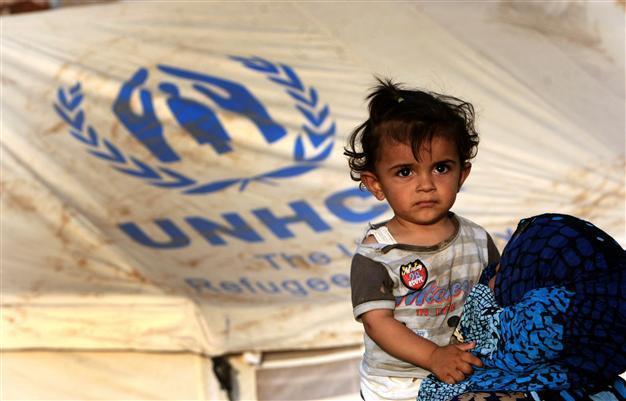One million children flee Syria conflict in 'tragic milestone': UN
GENEVA - Agence France-Presse

A Syrian-Kurdish woman carries her daughter at the Quru Gusik refugee camp, 20 kilometres east of the of Arbil, the capital of the autonomous Kurdish region of northern Iraq, on Aug. 22. AFP photo
One million children have fled war-torn Syria, the U.N. said on Aug. 23, marking what it called a "tragic milestone' in the conflict.
Another two million children have been forced from their homes and made refugees in their own country since the start of the war nearly two and a half years ago, said the U.N.
Antonio Guterres, the U.N. high commissioner for refugees, told reporters in Geneva that "(...) we are not here to celebrate any good news, but to mark another tragic milestone in the dramatic Syria crisis."
"One million is more than the number of children living in Wales. One million children is more than the number of children living in Los Angeles and Boston combined," he said.
In a statement, the head of the U.N. children's agency UNICEF, Anthony Lake, said the one millionth child refugee was "not just another number."
"This is a real child ripped from home, maybe even from a family, facing horrors we can only begin to comprehend," Lake said.
The sad figures come days after allegations that chemical weapons were used in Syria, killing hundreds of people including children.
U.N.-Arab League envoy Lakhdar Brahimi dubbed the Syria crisis "the biggest threat to peace and security in the world today", and urged the warring parties to negotiate.
'Lost generation'Most Syrian refugees have found a haven in neighbouring Lebanon, Jordan, Turkey and Iraq, who Guterres praised for shouldering the burden.
Many have also fled to Egypt, though that country's crisis has raised safety concerns, while others increasingly are heading to North Africa and Europe.
Guterres, who travels regularly to Syria's neighbouring countries to meet with refugees in camps and local communities, said the mental scars were all too clear from youngsters' drawings of bombing and killing, and the anger of adolescents.
"If one looks at the number of refugee children, and one adds the two million internally displaced inside, and the millions that are trapped in their villages and their cities in the middle of a war, we can really talk of the enormous risk of Syria facing the problem of a lost generation," he added.
Close to two million Syrians have fled their country, according to U.N. figures, which also show that three quarters of the one million child refugees are under the age of 11.
Syria's pre-war child population was some nine million, and around half are now either refugees, displaced, or live in war zones.
"This is the most serious crisis that children are in today," UNICEF's deputy director Yoka Brandt told reporters. A year ago, the number of child refugees was 70,000, she said.
"The unacceptable thing is that children, who have nothing to do with the war that causes this crisis... pay the heaviest price," Brandt said.
Rampant issue of child soldiersBesides the trauma of fleeing their homes and witnessing death and destruction, children face food shortages and miss out on their education. They face the threat of recruitment by Syria's warring sides, child labour and sexual exploitation.
More than 3,500 children now sheltering in Jordan, Lebanon and Iraq have crossed Syria's borders either unaccompanied or separated from their families.
Aid agencies have scrambled to meet the specific needs of youngsters, for example by vaccinating hundreds of thousands against measles and providing schools in camps and host-nation communities.
The U.N. has managed to register by name all one million children who have fled the country, and also helps to obtain birth certificates for babies born in exile to ensure they do not become stateless.
The Syrian war erupted in March 2011 after a crackdown on protests against the regime of President Bashar al-Assad, and has morphed into a bitter sectarian conflict.
Both Guterres and Brandt urged all sides to come to the table, though the U.N. refugee chief said there "aren't many reasons to be optimistic."
"Probably nobody would have forecast 30 months ago that we would still be in war today, and very probably this war will go on and on and on, and the humanitarian impact is becoming more and more devastating," said Guterres.
